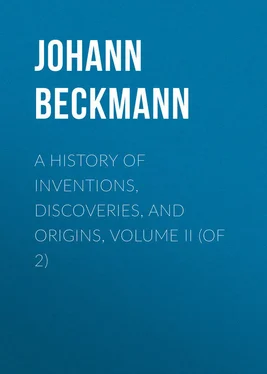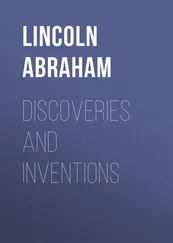Johann Beckmann - A History of Inventions, Discoveries, and Origins, Volume II (of 2)
Здесь есть возможность читать онлайн «Johann Beckmann - A History of Inventions, Discoveries, and Origins, Volume II (of 2)» — ознакомительный отрывок электронной книги совершенно бесплатно, а после прочтения отрывка купить полную версию. В некоторых случаях можно слушать аудио, скачать через торрент в формате fb2 и присутствует краткое содержание. Жанр: foreign_antique, foreign_prose, на английском языке. Описание произведения, (предисловие) а так же отзывы посетителей доступны на портале библиотеки ЛибКат.
- Название:A History of Inventions, Discoveries, and Origins, Volume II (of 2)
- Автор:
- Жанр:
- Год:неизвестен
- ISBN:нет данных
- Рейтинг книги:4 / 5. Голосов: 1
-
Избранное:Добавить в избранное
- Отзывы:
-
Ваша оценка:
- 80
- 1
- 2
- 3
- 4
- 5
A History of Inventions, Discoveries, and Origins, Volume II (of 2): краткое содержание, описание и аннотация
Предлагаем к чтению аннотацию, описание, краткое содержание или предисловие (зависит от того, что написал сам автор книги «A History of Inventions, Discoveries, and Origins, Volume II (of 2)»). Если вы не нашли необходимую информацию о книге — напишите в комментариях, мы постараемся отыскать её.
A History of Inventions, Discoveries, and Origins, Volume II (of 2) — читать онлайн ознакомительный отрывок
Ниже представлен текст книги, разбитый по страницам. Система сохранения места последней прочитанной страницы, позволяет с удобством читать онлайн бесплатно книгу «A History of Inventions, Discoveries, and Origins, Volume II (of 2)», без необходимости каждый раз заново искать на чём Вы остановились. Поставьте закладку, и сможете в любой момент перейти на страницу, на которой закончили чтение.
Интервал:
Закладка:
Menard and others conjecture that mirrors in the time of Homer were not much used, because he mentions them on no occasion, not even where he describes in so circumstantial a manner the toilet of Juno 144 144 Iliad. lib. xiv. ver. 166.
. In answer to this, however, I have two things to observe. In the first place, it is not to be expected that Homer should have mentioned every article with which he was acquainted; and secondly, we are assured by Callimachus, where he evidently has imitated the passage of Homer before-quoted 145 145 Hymnus in Lavacrum Palladis, v. 15, 21. It was however customary to ascribe a mirror to Juno, as Spanheim on this passage proves; and Athanasius, in Orat. contra Gentes, cap. xviii. p. 18, says that she was considered as the inventress of dress and all ornaments. Should not therefore the mirror, the principal instrument of dress, belong to her? May it not have been denied to her by Callimachus, because he did not find it mentioned in the description which Homer has given of her dressing-room?
, that neither Juno nor Pallas employed a mirror when they dressed. Mythology therefore did not allow the poet to introduce a mirror upon the toilet of that deity. Polydore Vergilius, Boccace, Menard, and others have all fallen into the error of making Æsculapius the inventor of mirrors, though Cicero 146 146 De Natur. Deorum, iii. 22.
seems to say the same thing; but the best commentators have long since observed very justly, that the Roman philosopher alludes not to a mirror but to a probe, the invention of which we may allow to the father of medicine, who was at first only a surgeon.
When one reflects upon the use made of metal mirrors, particularly at Rome, to add to magnificence and for other purposes, and how many artists, during many successive centuries, were employed in constructing them, and vied to excel each other in their art, one cannot help conjecturing that this branch of business must at those periods have been carried to a high degree of perfection. It is therefore to be regretted that they have not been particularly described by any writer, and that on this account the art was entirely lost after the invention of glass mirrors, which are much more convenient. No one at that time entertained the least suspicion that circumstances would afterwards occur which would render these metal mirrors again necessary, as has been the case in our days by the invention of the telescope. Our artists then were obliged to make new experiments in order to discover the best mixture for mirrors of metal; and this should be a warning to mankind, never to suffer arts which have been once invented and useful to become again unknown. A circumstantial description of them should at any rate be preserved for the use of posterity, in libraries, the archives of human knowledge.
When we compare metals in regard to their fitness for mirrors, we shall soon perceive that the hardest of a white colour possess in the highest degree the necessary lustre. For this reason platina is preferable to all others, as is proved from the experiments made by the Count von Sickengen. Steel approaches nearest to this new metal, and silver follows steel; but gold, copper, tin and lead, are much less endowed with the requisite property. I have however observed among the ancients no traces of steel mirrors; and it is probable they did not make any of that metal, as it is so liable to become tarnished, or to contract rust. An ancient steel-mirror is indeed said to have been once found, but as some marks of silvering were perceived on it, a question arises whether the silvered side was not properly the face of the mirror 147 147 Licetus de Lucernis Antiq. lib. vi. cap. 92.
. Besides, every person knows that a steel mirror would not retain its lustre many centuries amidst ruins and rubbish.
The greater part of the ancient mirrors were made of silver, not on account of costliness and magnificence, as many think, but because silver, as has been said, was the fittest and the most durable of all the then known unmixed metals for that use. In the Roman code of laws, when silver plate is mentioned, under the heads of heirship and succession by propinquity, silver mirrors are rarely omitted; and Pliny 148 148 Lib. xxxiv. cap. 17, p. 669.
, Seneca 149 149 Quæst. Nat. at the end of the first book.
, and other writers, who inveigh against luxury, tell us, ridiculing the extravagance of the age, that every young woman in their time must have a silver mirror. These polished silver plates may however have been very slight, for all the ancient mirrors, preserved in collections, which I have ever seen, are only covered with a thin coat of that expensive metal; and in the like manner our artists have at length learned a method of making the cases of gold and silver watches so thin and light, that every footman and soldier can wear one. At first the finest silver only was employed for these mirrors, because it was imagined that they could not be made of that which was standard; but afterwards metal was used of an inferior quality. Pliny tells us so expressly, and I form the same conclusion from a passage of Plautus 150 150 Mostell. act i. sc. 3. v. 101.
. Philematium having taken up a mirror, the prudent Scapha gives her a towel, and desires her to wipe her fingers, lest her lover should suspect by the smell that she had been receiving money. Fine silver however communicates as little smell to the fingers as gold; but it is to be remembered that the ancients understood much better than the moderns how to discover the fineness of the noble metals by the smell, as many modes of proof which we use to find out the alloy, were to them unknown. Money-changers therefore employed their smell when they were desirous of trying the purity of coin 151 151 Arrianus in Epictet. i. cap. 20, p. 79.
. The witty thought of Vespasian, who, when reproached on account of his tax upon urine, desired those who did so to smell the money it produced, and to tell him whether it had any smell of the article which was the object of it, alludes to this circumstance. In the like manner many savage nations at present can by their smell determine the purity of gold 152 152 Among the remaining passages of the ancients with which I am acquainted, in which mention is made of silver mirrors, the following deserves notice. Chrysostom, Serm. xvii. p. 224, who, in drawing a picture of the extravagance of the women, says, “The maid-servants must be continually importuning the silversmith to know whether their lady’s mirror be yet ready.” The best mirrors therefore were made by the silversmiths. It appears that the mirror-makers at Rome formed a particular company; at least Muratori, in Thesaur. Inscript. Clas. vii. p. 529, has made known an inscription in which collegium speculariorum is mentioned. They occur also in Codex Theodos. xiii. tit. 4, 2. p. 57, where Ritter has quoted more passages in which they may be found. But perhaps the same name was given to those who covered walls with polished stones, and in latter times to glaziers.
.
We are informed by Pliny, that Praxiteles, in the time of Pompey the Great, made the first silver mirror, and that mirrors of that metal were preferred to all others. Silver mirrors however were known long before that period, as is proved by the passage of Plautus above-quoted. To reconcile this contradiction, Meursius remarks that Pliny speaks only of his countrymen, and not of the Greeks, who had such articles much earlier, and the scene in Plautus is at Athens. This therefore seems to justify the account of Pliny, but of what he says afterwards I can find no explanation. Hardouin is of opinion, that mirrors, according to the newest invention, at that period, were covered behind with a plate of gold, as our mirrors are with an amalgam. But as the ancient plates of silver were not transparent, how could the gold at the back part of them produce any effect in regard to the image? May not the meaning be, that a thin plate of gold was placed at some distance before the mirror in order to throw more light upon its surface? But whatever may have been the case, Pliny himself seems not to have had much confidence in the invention.
Читать дальшеИнтервал:
Закладка:
Похожие книги на «A History of Inventions, Discoveries, and Origins, Volume II (of 2)»
Представляем Вашему вниманию похожие книги на «A History of Inventions, Discoveries, and Origins, Volume II (of 2)» списком для выбора. Мы отобрали схожую по названию и смыслу литературу в надежде предоставить читателям больше вариантов отыскать новые, интересные, ещё непрочитанные произведения.
Обсуждение, отзывы о книге «A History of Inventions, Discoveries, and Origins, Volume II (of 2)» и просто собственные мнения читателей. Оставьте ваши комментарии, напишите, что Вы думаете о произведении, его смысле или главных героях. Укажите что конкретно понравилось, а что нет, и почему Вы так считаете.












